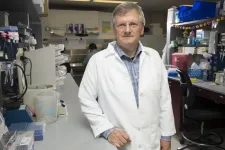The vaccines would protect people struggling with drug addiction or those at risk of accidental overdose. According to the National Institutes of Health, more than 106,000 U.S. drug overdose deaths were reported in 2021. Of those, 71,000 can be attributed to synthetic opioids like fentanyl.
Researcher Jay Evans directs the UM Center for Translational Medicine, which is working on the vaccines. He also is co-founder of Inimmune, the corporate partner charged with scaling up the vaccine components for manufacture. Inimmune is based in MonTEC, UM’s Missoula-based business incubator.
“We anticipate testing our vaccines in humans in early 2024,” Dr. Evans said. “The first vaccine will target heroin, followed shortly thereafter with a fentanyl vaccine in Phase I clinical trials. Once we establish safety and early efficacy in these first clinical trials, we hope to advance a combined multivalent vaccine targeting both heroin and fentanyl.”
He said the vaccines start with Dr. Marco Pravetoni, a professor of psychiatry and behavioral sciences at the University of Washington who directs the Center for Medication Development for Substance Use Disorders. His research team designs haptens and drug conjugate vaccines that can elicit the production of antibodies against target opioids.
Pravetoni has worked on vaccines against opioids for over a decade, bringing one candidate oxycodone vaccine to human testing in Phase I clinical trials with collaborator Dr. Sandra Comer of Columbia University.
“Our vaccines are designed to neutralize the target opioid, while sparing critical medications such as methadone, buprenorphine, naltrexone and naloxone, which are used in treatment of opioid addiction and reversal of overdose,” he said.
The UM team contributes a patented adjuvant called INI-4001 to the vaccine cocktails. Adjuvants are substances that boost the effectiveness of vaccines.
“Our adjuvants improve the vaccine response, providing a stronger and more durable immunity,” Evans said. “We have worked closely with researchers from Inimmune, the University of Minnesota, the University of Washington, Hennepin Healthcare Research Institute and Columbia University over the past few years to design and optimize anti-opioid vaccines for advancement to human clinical trials.”
Evans said the work is 100% funded by the National Institutes of Health. A few years ago, UM earned a $33.4 million contract to develop and advance two candidate anti-opioid vaccines through Phase 1 clinical trials. This work is supported by the NIH Helping to End Addiction Long-Term (HEAL) initiative.
The vaccines were tested with animal models to support their advancement to human clinical trials. Mice were tested at UM and rats and pigs at the University of Minnesota. Papers demonstrating how the TLR7/8 adjuvant increased the effectiveness of the fentanyl vaccine among animals were published recently in the journal NPJ Vaccines. Publications on the success of the heroin vaccine are forthcoming.
There are many moving pieces in vaccine development, and Evans expects the heroin vaccine human trials to begin before the fentanyl, even though the fentanyl papers published first. The team expects to finalize their Investigational New Drug applications to the FDA later this year.
“The human clinical trials will include a drug challenge to evaluate both safety and efficacy of the vaccines in early clinical development,” he said. “We will also follow the patients to evaluate how long the antibodies against opioids will last.”
The Phase 1 human trials will be conducted with Dr. Comer at Columbia University in New York City. Evans said it could take six months or longer to recruit and enroll the required subjects: people who are using fentanyl or heroin. According to DrugAbuse.com, the relapse rate for heroin and opioid users hovers around 90%. Evans said the vaccines could save lives and help people seeking treatment.
He said the Phase 1 trials involve gradual dose escalation.
“We start with the lowest dose – a dose that may not be effective,” Evans said. “Phase I clinical trials are focused on safety. When the first dose cohort is complete, a data safety monitoring board reviews the data and approves testing at the next dose level if the vaccine is safe. The process takes time until you reach dose levels that are both safe and effective.”
After that, Phase 2 human trials determine things like the number of doses needed to be effective and the amount of time required between doses. Phase 3 is the all-important efficacy study that involves many participants that the FDA uses to determine whether the benefits of the vaccine outweigh potential risks.
“It takes a long time – years – to get to a final approved product,” Evans said. “Based on the efficacy data we see in our preclinical data and the established safety profile in animal models, we are very hopeful these vaccines will be successful. But there is still a lot of work to be done.”
He said Inimmune and the University of Washington are working on the process development and scale-up manufacturing of “GMP” – good manufacturing practices – to produce the volumes and quality of vaccine products necessary for Phase 1 human trials.
Together, the UM Center for Translational Medicine and Inimmune employ about 70 people on campus and across the river at MonTEC. Evans believes they offer one of the largest university-based academic research teams for vaccine discovery and development in the U.S., and they were a major reason UM landed on a 2020 list titled “Best Universities Solving the Coronavirus Pandemic.”
In addition to the anti-opioid vaccines, the UM team is working on vaccines targeting SARS-CoV-2, the influenza virus, tuberculosis, monkeypox, pertussis, pseudomonas, Lyme disease, valley fever, malaria, E. coli, allergy and cancer.
“We expect to see other vaccine candidates advance to Phase I clinical trials in the coming years,” Evans said. “Some are new vaccines, and others are improved versions of current vaccines with adjuvants added to increase vaccine safety, durability and efficacy in vulnerable populations.”
Evans said UM students have become an incredible asset for his center and Inimmune. Undergraduate interns, graduate students and postdocs work in all their labs.
“We are a university campus, and training students has become a big part of our process,” he said. “I think they are part of the reason our group has grown like it has.
“Doing what we do can be a grind, and students bring a fresh level of energy and enthusiasm,” Evans said. “They get excited: ‘Oh, my gosh, I’m working on a fentanyl vaccine, or I’m working on a COVID or flu or monkeypox vaccine!’ They bring a different level of enthusiasm and excitement because it’s new to them.
“So our only goal isn’t just to come up with new drugs and treatments, it’s also to educate students.”
###
END








